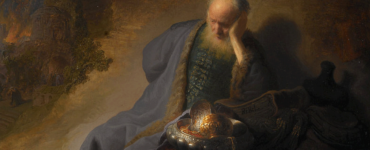Times of stress often lead to periods of deep introspection. Lent is already a period set aside by the Church for reflection and thoughtfulness. This is signified by reduced or at least subdued liturgical use of music. The “Gloria” and the “Alleluias” are not sung or said during Eucharist, descants and other flourishes are dispensed with, and in places with more strict observances there would not be any solo instrumental music, the organ being used only to accompany singing.
This is not because we want to stifle joy and praise, but because Lent is a time of preparation. We are keeping back the good wine until the appropriate moment for celebration; we are, in a very literal sense, going without, giving up something in order to focus our minds on what is to come. This delayed gratification will make celebrating the day of Resurrection all the more glorious and wonderful.
The regimen of self-reflection that we are called upon to engage in during this season can take many forms. Abstinence is the most commonly thought of, but this does not extend to doing away with the sacraments or other essential elements of regular worship. In fact, it has been suggested that Lent might actually be a time for taking on something new and positive, rather than giving something up. It is not so much about doing without as doing with purpose; our introspection leads us to try harder to make ourselves a little better.
In Australia, the most serious restrictions from the COVID-19 epidemic have coincided with Lent, deepening our desire to seek answers, to review what is most important and valuable to us and to reflect on the state of the world. We look forward to Easter as we look forward to the renewal of life once the epidemic has passed. The forty days of Lent, then, has parallels to the period of quarantine (literally, forty days) introduced in the fourteenth century to combat the spread of plague. The equivalence is not coincidence: the quarantine period was based on the forty days that Jesus spent fasting in the desert, isolated from others and being tempted but not giving in.
So, the music we give up during Lent helps us to focus on the joy that is to come. Many of the Psalms exhort us to sing to the Lord. Psalm 5 asks the Lord to “give heed to my sighing”:
But let all those that put their trust in thee rejoice:
Let them ever shout for joy, because thou defendest them:
Let them also that love thy name be joyful in thee.
Yet it is hard to be joyful in such difficult times, with so many across the world so sick and frightened. But we must also remember that Lent is not inherently a time of sadness. The “Gloria in excelsis Deo” may not be sung, but we do still sing the “Gloria Patri” after the Psalms and at the end of the Canticles (even if our choirs and congregations cannot gather together in person). We are not giving up happy music, only moderating the excesses of celebration until the appropriate time. Until that time, we are called, like Jesus in the wild, to reflect on our desire to do better and triumph over temptation and evil. As the Song of Solomon reminds us so poetically, we must live in hope:
For now the winter is past,
The rain is over and gone.
The flowers appear on the earth;
The time of singing has come.




Add comment